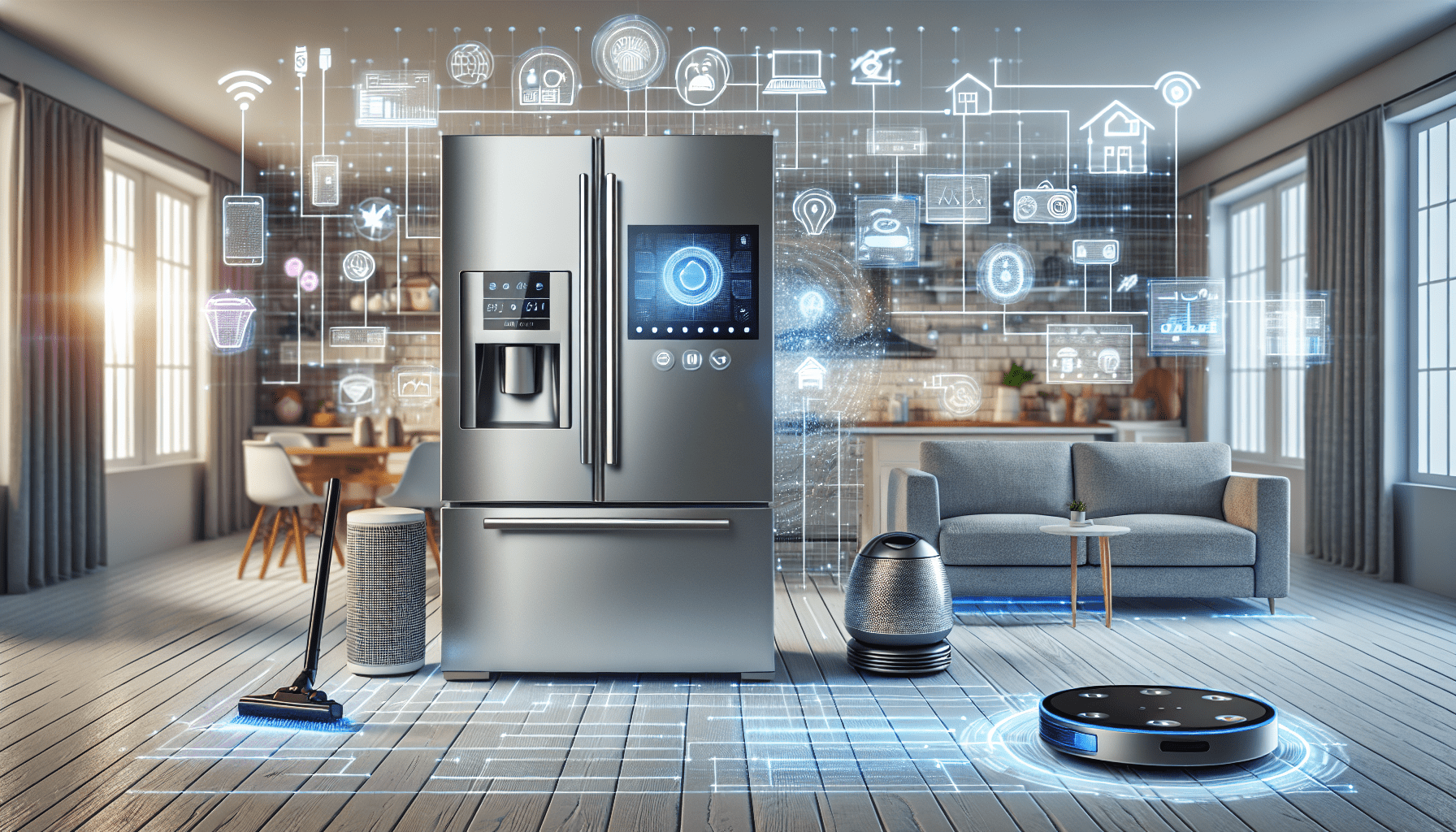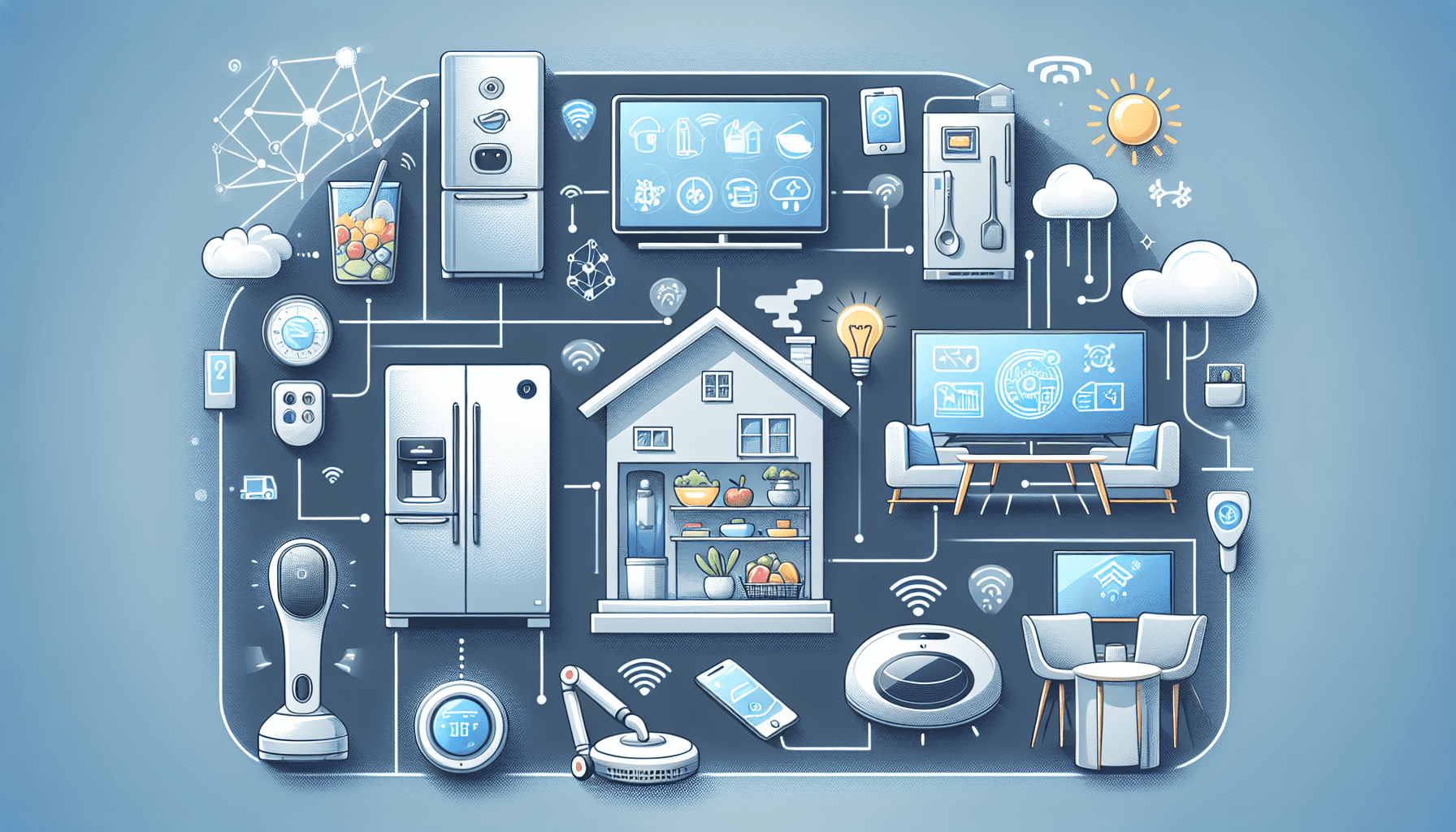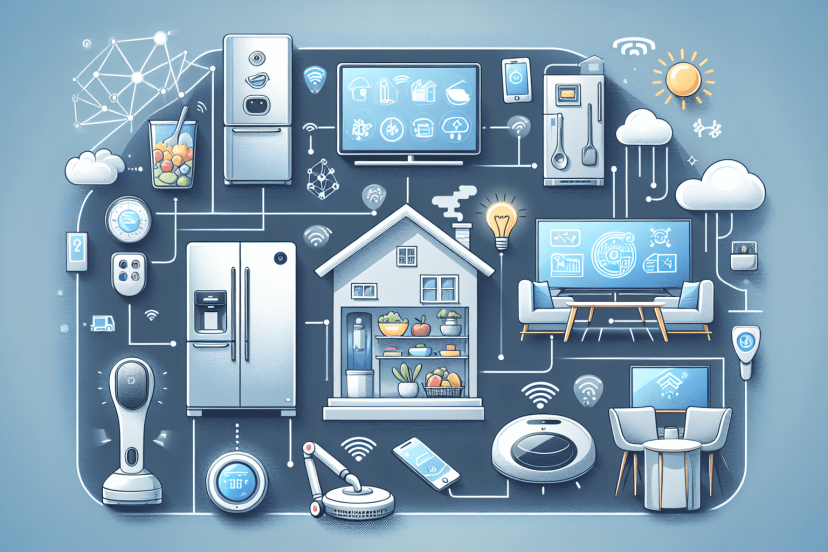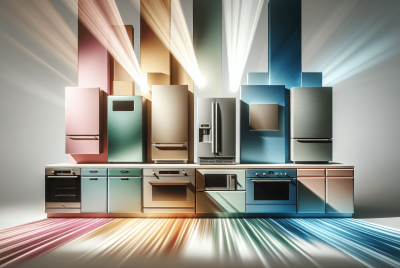What Is Meant By Smart Appliances?
Imagine a world where your appliances could anticipate your needs and make your life easier. That’s the concept behind smart appliances. In today’s fast-paced world, these innovative devices have become increasingly popular, promising convenience, efficiency, and even cost savings. Whether it’s a refrigerator that can suggest recipes based on its contents or a washing machine that can be controlled from your smartphone, smart appliances are revolutionizing the way we interact with our everyday household items. Let’s explore what exactly is meant by smart appliances and how they are reshaping our homes and our lives.

Definition of Smart Appliances
Overview of Smart Appliances
Smart appliances refer to household devices or machines that have been enhanced with advanced technology, enabling them to connect to the internet and offer various convenient features. These appliances are designed to simplify daily tasks, improve efficiency, and provide an enhanced user experience. By leveraging the power of the Internet of Things (IoT) and artificial intelligence (AI), smart appliances offer a seamless integration with other smart devices and provide a wide range of benefits to homeowners.
Features of Smart Appliances
Smart appliances come with a variety of features that set them apart from traditional appliances. Some common features include:
-
Remote control functionality: Smart appliances can be controlled and monitored remotely using a smartphone or tablet. This allows you to manage your appliances even when you’re away from home, providing added convenience and peace of mind.
-
Energy-saving capabilities: Smart appliances are designed to optimize energy usage, helping you reduce your carbon footprint and save on utility bills. They can automatically adjust settings based on usage patterns and provide energy consumption data to help you make informed decisions.
-
Connectivity and interoperability: Smart appliances can connect to your home’s Wi-Fi network, allowing for seamless integration with other smart devices and systems. This enables you to create a unified smart home ecosystem where appliances work together harmoniously.
-
Artificial intelligence integration: Smart appliances can leverage AI algorithms to learn your preferences, anticipate your needs, and make intelligent decisions. This personalized experience enhances efficiency and convenience, making everyday tasks easier and more enjoyable.
Benefits of Smart Appliances
Convenience and Efficiency
The main advantage of smart appliances is the convenience they offer. By enabling remote control functionality, these appliances allow you to operate them from anywhere. For example, you can start preheating your smart oven while you’re still at work, ensuring that it’s ready to cook when you arrive home. Similarly, you can remotely control your smart washing machine to start a load of laundry while you’re out running errands. This level of convenience saves you time and effort, making everyday tasks more efficient.
Energy Saving
Smart appliances are designed with energy-saving capabilities in mind. They can monitor and optimize their energy usage based on patterns and user preferences. For instance, smart air conditioners can automatically adjust temperature settings based on occupancy, weather conditions, and time of day. Smart refrigerators can optimize cooling and reduce energy consumption during periods of low usage, such as when you’re on vacation. These Energy-saving features not only help reduce your environmental impact but also result in significant cost savings over time.
Remote Control Functionality
One of the standout features of smart appliances is their ability to be controlled remotely. Whether you’re at the office, running errands, or on vacation, you can easily manage your appliances using your smartphone or tablet. This remote control functionality allows you to turn appliances on or off, adjust settings, and receive notifications or alerts. For example, you can remotely start your dishwasher when you’re on your way home so that it finishes by the time you arrive. This level of control enhances convenience and flexibility in managing your household tasks.
Types of Smart Appliances
Smart Refrigerators
Smart refrigerators offer advanced features that go beyond traditional refrigeration. They can connect to the internet, providing access to a host of useful functions. Smart refrigerators often include features such as:
-
Inventory tracking: Smart refrigerators can keep track of the items stored within, alerting you when supplies are running low or nearing expiration.
-
Recipe suggestions: Some smart refrigerators can suggest recipes based on the ingredients you have on hand, making meal planning and preparation easier.
-
Temperature control: Smart refrigerators allow you to adjust the temperature settings remotely to cater to specific storage needs, such as keeping vegetables fresher for longer.
Smart Ovens
Smart ovens bring a new level of convenience and precision to cooking. These appliances can be controlled remotely and offer features such as:
-
Preheating from anywhere: Smart ovens enable you to preheat them remotely, allowing you to start cooking as soon as you’re ready, even if you’re not physically near the oven.
-
Recipe guides and cooking presets: Some smart ovens come with built-in recipe guides and cooking presets, making it easier to achieve perfect results every time.
-
Integration with smart assistants: Smart ovens can connect with popular smart assistants like Amazon Alexa or Google Assistant, enabling voice control and hands-free operation.
Smart Washing Machines
Smart washing machines revolutionize laundry tasks by offering advanced features and functionality. Key features include:
-
Remote monitoring and control: With a smart washing machine, you can monitor laundry cycles and receive notifications when a load is complete or if any issues arise.
-
Customized settings: Smart washing machines allow you to customize settings such as water temperature, cycle duration, and spin speed, ensuring optimal cleaning performance for different types of fabrics.
-
Energy optimization: These appliances can automatically detect the load size and adjust water and energy consumption accordingly, optimizing efficiency and reducing waste.
Smart Dishwashers
Smart dishwashers offer convenience and efficiency when it comes to dishwashing. Notable features include:
-
Remote start and control: You can remotely start or schedule dishwashing cycles, ensuring that your dishes are cleaned and ready when you need them.
-
Sensor technology: Smart dishwashers use sensors to detect the level of dirtiness and adjust water pressure and temperature accordingly, ensuring effective cleaning while optimizing water and energy usage.
-
Integration with smart home systems: Some smart dishwashers can integrate with other smart home systems, allowing for automated operations based on your preferences and routines.
Smart Air Conditioners
Smart air conditioners provide enhanced comfort and energy efficiency. Key features include:
-
Intelligent temperature control: Smart air conditioners can adjust temperature settings based on room occupancy and environmental conditions, ensuring optimal comfort while minimizing energy consumption.
-
Remote control and scheduling: You can remotely control your smart air conditioner, adjust settings, and schedule temperature changes to ensure a comfortable living space when you arrive home.
-
Energy consumption monitoring: Smart air conditioners can provide real-time energy consumption data, helping you track and manage your energy usage to save on utility bills and reduce your environmental impact.

Internet of Things (IoT) Integration
Explanation of IoT Integration
The Internet of Things (IoT) is a network of connected devices that can communicate and exchange data with each other through the internet. Smart appliances are a crucial part of the IoT ecosystem, as they connect to the internet and integrate seamlessly with other smart devices and systems in a home. This integration enables the appliances to share information, receive commands, and provide a synchronized and unified user experience.
How Smart Appliances Connect to IoT
Smart appliances connect to the IoT through Wi-Fi or other wireless communication protocols. By connecting to a home’s Wi-Fi network, smart appliances gain access to the internet and can communicate with other devices and services. This connectivity allows for the exchange of data and control commands, enabling interaction and automation between different smart devices.
The connectivity of smart appliances to the IoT ecosystem opens up endless possibilities for automation, data exchange, and customization. For example, a smart oven can receive recipe suggestions from a smartphone app, adjust its settings based on the selected recipe, and send notifications to the user’s smartwatch when cooking is complete. This seamless integration enhances convenience, efficiency, and user experience.
Artificial Intelligence in Smart Appliances
Applications of AI in Smart Appliances
Artificial intelligence (AI) plays a vital role in enhancing the capabilities and performance of smart appliances. AI algorithms allow appliances to learn from user behavior, adapt to preferences, and make intelligent decisions. Some common applications of AI in smart appliances include:
-
Predictive maintenance: AI algorithms can analyze data from smart appliances to detect potential issues or malfunctions before they occur. This enables proactive maintenance, minimizing downtime and extending the lifespan of the appliances.
-
Energy optimization: AI can analyze usage patterns, weather data, and user preferences to optimize energy usage in smart appliances. For example, AI algorithms can automatically adjust the cooling temperature in a smart refrigerator based on the user’s habits and external conditions.
-
Personalized recommendations: AI can analyze user behavior and preferences to offer personalized recommendations. For example, a smart oven can suggest cooking times and temperatures based on the user’s past cooking history and desired level of doneness.
Smart Assistant Integration
Many smart appliances can integrate with popular smart assistants such as Amazon Alexa or Google Assistant. This integration allows users to control and interact with their appliances using voice commands. For example, you can ask your smart assistant to preheat your oven to a specific temperature, start or stop a laundry cycle, or adjust the temperature settings on your air conditioner. The integration of smart assistants with smart appliances adds an extra layer of convenience and ease of use, making everyday tasks more seamless and intuitive.
Security and Privacy Concerns
Potential Risks and Vulnerabilities
As with any technology that connects to the internet, smart appliances carry some security and privacy risks. The main concerns associated with smart appliances include:
-
Data breaches: If not properly secured, smart appliances can be vulnerable to hacking and data breaches, potentially exposing your personal information or allowing unauthorized access to your home network.
-
Privacy invasion: Some smart appliances, such as security cameras or voice-controlled devices, may raise concerns about invasion of privacy. It is essential to understand and control the data collected and transmitted by these appliances to protect your privacy.
-
Lack of updates: Manufacturers must regularly provide firmware and security updates for smart appliances to address vulnerabilities and protect against emerging threats. Failure to update can leave appliances susceptible to exploitation.
Protecting Personal Data
To mitigate security and privacy risks, it is important to take proactive steps to protect your personal data when using smart appliances:
-
Secure your home network: Ensure that your home Wi-Fi network is password protected and encrypted. Use a strong, unique password and consider implementing additional security measures, such as a firewall or a virtual private network (VPN).
-
Keep software up to date: Regularly check for firmware updates from the manufacturer and install them promptly. These updates often include security patches that address vulnerabilities and enhance the overall security of the appliance.
-
Understand data collection practices: Read the privacy policies and terms of service for your smart appliances to understand what data is collected, how it is used, and who has access to it. Opt for appliances that allow you to control and limit the data collection.
-
Change default settings: Change default passwords and settings for your smart appliances to enhance security. Use strong, unique passwords and enable additional security features, such as two-factor authentication, if available.
-
Regularly review connected devices: Periodically review the devices connected to your home network and remove any that are no longer in use or unfamiliar. This reduces the potential attack surface for hackers and enhances overall security.
By implementing these security measures, you can minimize the risks and enjoy the benefits of smart appliances with peace of mind.
Popular Smart Appliance Brands
Overview of Leading Brands
Several reputable brands offer a wide range of smart appliances that cater to different needs and budgets. Some leading brands in the smart appliance market include:
-
Samsung: Samsung offers a comprehensive range of smart appliances, including refrigerators, washing machines, ovens, and air conditioners. Their appliances are known for their advanced technology, intuitive interfaces, and seamless connectivity.
-
LG: LG is another prominent brand that offers a variety of smart appliances. Known for their innovative features and sleek design, LG appliances are popular among tech-savvy consumers.
-
Whirlpool: Whirlpool is a well-established brand that offers a range of connected appliances. They focus on energy efficiency and innovative features that simplify daily tasks.
-
GE Appliances: GE Appliances offers a wide selection of smart appliances, including refrigerators, dishwashers, ovens, and laundry appliances. Their appliances are known for their reliability, performance, and advanced connectivity options.
Features and Offerings
Each brand has its unique product offerings and features. Some common features across popular smart appliance brands include:
-
Wi-Fi connectivity: All major brands offer smart appliances that connect to your home’s Wi-Fi network, allowing for remote control and monitoring.
-
App integration: Brands provide dedicated mobile apps that enable you to control and manage your appliances conveniently from your smartphone or tablet.
-
Energy-saving capabilities: Leading brands prioritize energy efficiency by offering appliances with advanced energy management features, such as automatic energy optimization and monitoring.
-
Voice control integration: Many brands integrate their appliances with popular smart assistants, such as Amazon Alexa or Google Assistant, allowing for hands-free operation through voice commands.
-
Advanced sensors and detection: Smart appliances from reputable brands often include advanced sensors and detection systems that enhance performance, efficiency, and safety.
By exploring the offerings from different brands and considering your specific needs, you can find smart appliances that best suit your requirements and preferences.
Future Trends in Smart Appliances
Enhanced Connectivity and Interoperability
Future smart appliances are expected to have enhanced connectivity features, allowing for seamless integration with other devices and services. These appliances will be able to communicate and interact with various smart home systems, such as lighting, security, and entertainment, creating a unified and intelligent living environment.
Voice Command Integration
Voice command integration is anticipated to become more prevalent in smart appliances. As voice assistants continue to improve and gain popularity, smart appliances will increasingly respond to voice commands, making controlling and operating them more intuitive and effortless.
Energy Optimization
Energy optimization will continue to be a priority in smart appliances. Manufacturers will strive to develop more advanced algorithms and sensors to maximize energy efficiency while maintaining optimal performance. This focus on energy conservation will not only reduce environmental impact but also result in significant cost savings for consumers.
Cost Considerations
Initial Investment
Smart appliances often carry a higher price tag compared to their traditional counterparts due to the advanced technology and connectivity features they offer. Depending on the brand, type, and specific features, smart appliances can range from a few hundred dollars to several thousand dollars. However, it’s important to consider the potential long-term savings and benefits they provide before making a purchase decision.
Potential Savings
While the initial investment for smart appliances may be higher, they can lead to long-term savings in various ways. Energy-saving features, such as optimized usage and monitoring, can result in reduced utility bills. Remote control functionality allows for efficient use of appliances, minimizing wastage and ensuring optimal performance. Additionally, predictive maintenance capabilities can help prolong the lifespan of appliances, reducing the need for repairs or replacements in the future.
Conclusion
Smart appliances have revolutionized the way we carry out daily household tasks, offering convenience, efficiency, and enhanced functionality. Through IoT integration and AI capabilities, these appliances provide a seamless and personalized user experience. While there are security and privacy considerations, adopting proactive measures can mitigate potential risks. As leading brands continue to innovate and introduce new features, the future of smart appliances promises even greater connectivity, energy optimization, and integration with smart assistants. Considering the long-term cost savings and overall benefits, the adoption of smart appliances is a promising trend that is likely to grow in the years to come. So, whether you’re looking to simplify your chores, save energy, or enhance your lifestyle, smart appliances offer a compelling solution that will truly transform your home.




